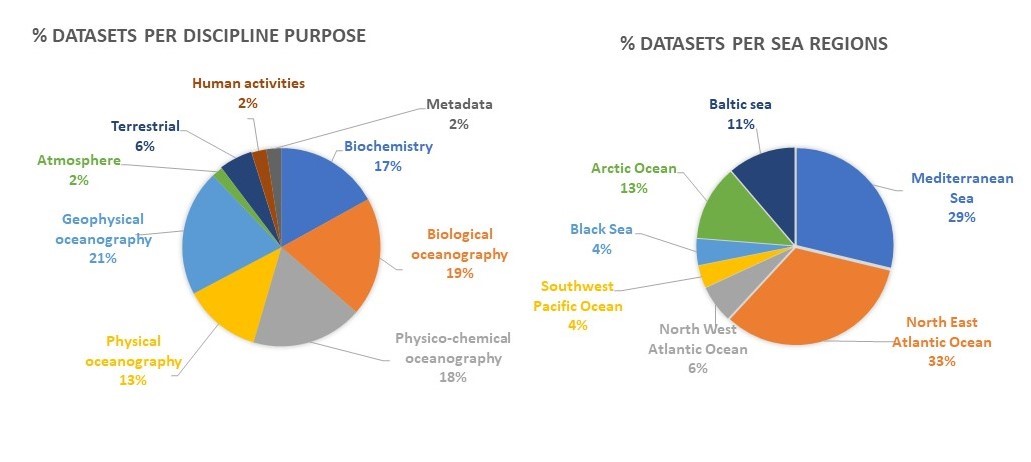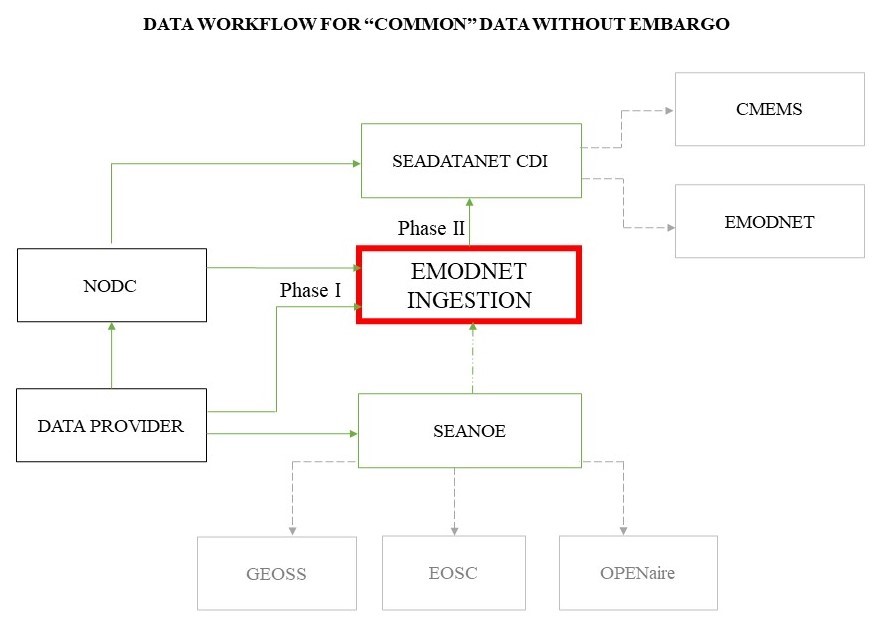Active between 2019 and 2023, Eurofleets+ brought together a wide network of 42 partners from various European marine research institutes and universities, funding 28 projects across 23 Transnational Access (TA) cruises. During these cruises, 164 multidisciplinary data sets were generated (Fig. 1) and made easily discoverable and publicly accessible via marine data management and data exchange infrastructures. Tailored guidelines provided by Responsible Data Centres (RDCs) associated with Eurofleets+ (HCMR, OGS, and RBINS), facilitated easier management of metadata and data, including data validation and curation, before publication on data repositories and infrastructures such as the EMODnet Ingestion, SeaDataNet SEA ScieNtific Open data Edition (SEANOE) data citing service, and SeaDataNet CDI service.
The user organisation
Eurofleets+ is a Horizon 2020 funded initiative aimed at providing open and free-of-charge access to state-of-the-art European research vessels and marine equipment through Transnational Calls. Its objectives include easing access to and management of marine data and enhancing the sustainability of marine research infrastructures. Active between 2019 and 2023, Eurofleets+ brought together a wide network of 42 partners from various European marine research institutes and universities, funding 28 projects across 23 Transnational Access (TA) cruises.
During these cruises, 164 multidisciplinary data sets were generated (Fig. 1) and made easily discoverable and publicly accessible via marine data management and data exchange infrastructures. Tailored guidelines provided by Responsible Data Centres (RDCs) associated with Eurofleets+ (HCMR, OGS, and RBINS), facilitated easier management of metadata and data, including data validation and curation, before publication on data repositories and infrastructures such as the EMODnet Ingestion, SeaDataNet SEA ScieNtific Open data Edition (SEANOE) data citing service, and SeaDataNet CDI service.
Eurofleets+ thus highlighted the complementarity between scientific expertise in providing quality data and the experience of National Oceanographic Data Centres (NODCs) in leading data stewardship, thereby producing trustworthy open research data.

Fig. 1: 164 interdisciplinary datasets, 28 cruise projects (2020-2023): biochemistry (e.g. nutrients, acidification parameters), biological (e.g. abundances, taxonomy, eDNA), physico-chemical (e.g. CTD with various sensors), geophysical disciplines (e.g. bathymetry, seismic)
Challenges faced by the user and EMODnet services used
Principal Investigators (PIs) of projects selected for TA cruises were required to gather data, provide a Cruise Report to Eurofleets+, and submit metadata and data to the EMODnet Ingestion Submission service (Fig. 2). Assigned RDCs then completed the submission for "as-is" publication (Phase I, Fig. 2) and helped with formatting, validating, and harmonising data sets, where possible, into Common Data Index (CDI) entries, which were published via the SeaDataNet CDI Service (Phase II, Fig. 2) for integration into the EMODnet data products. For data types not fitting into the CDI repository, such as eDNA or pictures, phase II could not be achieved and the submitted data remained ‘as is’ in EMODnet Ingestion Phase I. In cases where PIs wanted their data sets as citable resources the SeaDataNet SEANOE publication service was used.
This protocol ensured compliance with FAIR (Findable, Accessible, Interoperable, and Reusable) principles and open research data principles.

Fig. 2: EMODnet Ingestion played a central role in the Eurofleets+ data workflow. The “common” workflow is presented here, for other workflows, see Le et al., 2023.
Several challenges were faced by the PIs of the projects, including:
- Timely delivery of data: Delays could arise due to the time required for laboratory analysis or complications during data processing. The COVID-19 pandemic exacerbated these delays, causing rescheduling of cruises and pushing dataset deliveries beyond the project's timelines.
- Incomplete data submissions: Datasets were sometimes handed over in batches with missing data, often due to longer-than-expected processing times for lab samples.
- Standardisation issues and completeness of data: Data management processes sometimes lacked the use of common, standardised vocabularies and quality checks.
- Effort and time allocation: Unplanned, time-consuming efforts for data management tasks within the research projects led to delays and required additional coaching from RDCs to meet data management commitments.
The challenges faced by project PIs highlighted the need for a robust data management approach and infrastructure, driving Eurofleets+ to use SeaDataNet and EMODnet Ingestion for data uploading, publication, and dissemination. EMODnet Ingestion enabled the initial submission and "as-is" publication of raw data, playing a role of central mailbox for data deposition, ensuring prompt and open access. EMODnet Ingestion central role in the Eurofleets+ data workflow (Fig. 2) facilitated the project data ingestion workflows towards the European data infrastructures of EMODnet, CMEMS, EurOBIS and SeaDataNet. For instance, the EMODnet Bathymetry service was used to make high-quality, standardised bathymetric data accessible for various marine research applications. In addition SEANOE harvesting by GEOSS, EOSC and OPENaire allowed Eurofleets+ datasets to be available to these systems also.
By leveraging these services and data streams Eurofleets+ ensured efficient management and accessibility of marine data for the broader scientific community.
Impact of EMODnet
Multiple and multidisciplinary projects under the Eurofleets+ initiative have successfully reached EMODnet Ingestion services to disseminate their marine research data. EMODnet Ingestion facility addressed data management challenges, ensured standardisation, and improved data accessibility. Among all projects, 70% have been preserved, over 40% are or will be Findable and Accessible, and over 30% are or will be Interoperable and Reusable.
The cooperation between EMODnet Ingestion and Eurofleets+ has enabled harmonised data management and publication across marine disciplines. This support has helped scientists make their data FAIR, providing valuable reusable data for the entire society, including for monitoring coastal evolution, biodiversity, and climate change.
References
Le, H. M., Iona, S., Partescano, E., Schaap, D., 2023. Synthesis of the data management follow-up reports, lessons learned and recommendations. Eurofleets+ D 4.15, V1.1
Schaap, D., Diez Tagarro, S., Autermann, C., 2023. Research and en-Route data collection exploitation and promotion final report. Eurofleets+ D 9.15, V2.0.
